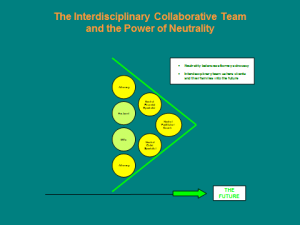
In Part I we learned that advocacy in the “rights-based” Court Model is hard on the people involved because by focusing on the 3
rd-party decision maker, e.g., the judge, the parties care little about each other’s view. As a result, their relationship can become more adversarial. In Part II we learned that by removing the decision maker in the “interest-based” Collaborative Model the parties become the decision makers who resolve mutual problems based on their defined future needs, interests, and goals. But is the removal of the 3
rd party decision maker enough to create a process that is truly “soft” on the people?
Most people who have gone through a divorce agree that divorce is much more than a legal event. More importantly divorce is about changing relationships, improving communication, establishing co-parenting, engaging in problem-solving, and securing a stable financial future. But many divorce processes do not adequately address these more important concerns, thus limiting divorce to simply a legal commodity.
To gain the
added value of improving your relationship with your soon-to-be ex-spouse, of becoming successful co-parents, of mutually planning for the future, and of customizing your financial arrangement to meet the needs of all family members within the resources available, requires the assistance and expertise of NEUTRAL professionals. These neutral professionals include a Neutral Financial Professional, a Neutral Coach, and a Neutral Child Specialist. This team approach is the “secret sauce” used in the Collaborative Model that can transform the experience of this life event into something constructive, affirming, and even peaceful. Obviously, this is of great benefit to children.

In addition to the support and expertise provided, the neutrality of the neutral professionals balances attorney advocacy. This permits the attorney to stay in the problem-solving and interest-based advocacy role for his or her client, while the neutral professionals hold the ground for resolution on behalf of the whole family. This interdisciplinary, holistic approach to advocacy and expertise is what distinguishes the Collaborative Model from any other model out there.
Collaborative professionals like to say this model contributes to world peace one family at a time. If this approach makes sense to you, tell your friends, family, and colleagues about the Collaborative Model and contribute to world peace.
 In a recent first meeting with new clients, I was obtaining family history to help ground me in both parents’ perspectives on issues related to their divorce. A comment by the dad struck a chord for me. He said, “I believe the way I can become the best parent to my child is by getting a divorce.”
At first glance this comment seems counter-intuitive. Most children would prefer their parents remain married or partnered and under one roof. Divorce is usually a life crisis for children and their parents. Divorce is necessarily about grief and loss. How does it follow that a divorce can result in better parenting?
The answer is that many parents whose marriages don’t work are able to enter into a co-parenting relationship that does work. In these families, children remain at the center of their parents’ concern and out of the middle of their parents’ conflicts. Especially if the decision to get unmarried is mutual, and a reservoir of trust and good will about parenting has been preserved, it can relieve a great deal of stress in the home to decide (though often with great sadness) to let go of the marriage while embracing a new lifelong role as co-parents. Children can continue to feel safe and loved in the context of a healthy co-parenting relationship. Effective co-parents are mindful and committed to being present for and attuned to the needs of their children, and this is the foundation of their children’s resilience and hope.
Collaborative Team Practice offers specialized mental health resources to support and reinforce healthy and effective co-parenting during and after a divorce. Neutral child specialists and neutral coaches help parents create Parenting Plans and Relationship Plans as detailed and unique guides for positive co-parenting. It is indeed possible to divorce with the goal of becoming the best parent one can be.
In a recent first meeting with new clients, I was obtaining family history to help ground me in both parents’ perspectives on issues related to their divorce. A comment by the dad struck a chord for me. He said, “I believe the way I can become the best parent to my child is by getting a divorce.”
At first glance this comment seems counter-intuitive. Most children would prefer their parents remain married or partnered and under one roof. Divorce is usually a life crisis for children and their parents. Divorce is necessarily about grief and loss. How does it follow that a divorce can result in better parenting?
The answer is that many parents whose marriages don’t work are able to enter into a co-parenting relationship that does work. In these families, children remain at the center of their parents’ concern and out of the middle of their parents’ conflicts. Especially if the decision to get unmarried is mutual, and a reservoir of trust and good will about parenting has been preserved, it can relieve a great deal of stress in the home to decide (though often with great sadness) to let go of the marriage while embracing a new lifelong role as co-parents. Children can continue to feel safe and loved in the context of a healthy co-parenting relationship. Effective co-parents are mindful and committed to being present for and attuned to the needs of their children, and this is the foundation of their children’s resilience and hope.
Collaborative Team Practice offers specialized mental health resources to support and reinforce healthy and effective co-parenting during and after a divorce. Neutral child specialists and neutral coaches help parents create Parenting Plans and Relationship Plans as detailed and unique guides for positive co-parenting. It is indeed possible to divorce with the goal of becoming the best parent one can be.  In a recent first meeting with new clients, I was obtaining family history to help ground me in both parents’ perspectives on issues related to their divorce. A comment by the dad struck a chord for me. He said, “I believe the way I can become the best parent to my child is by getting a divorce.”
At first glance this comment seems counter-intuitive. Most children would prefer their parents remain married or partnered and under one roof. Divorce is usually a life crisis for children and their parents. Divorce is necessarily about grief and loss. How does it follow that a divorce can result in better parenting?
The answer is that many parents whose marriages don’t work are able to enter into a co-parenting relationship that does work. In these families, children remain at the center of their parents’ concern and out of the middle of their parents’ conflicts. Especially if the decision to get unmarried is mutual, and a reservoir of trust and good will about parenting has been preserved, it can relieve a great deal of stress in the home to decide (though often with great sadness) to let go of the marriage while embracing a new lifelong role as co-parents. Children can continue to feel safe and loved in the context of a healthy co-parenting relationship. Effective co-parents are mindful and committed to being present for and attuned to the needs of their children, and this is the foundation of their children’s resilience and hope.
Collaborative Team Practice offers specialized mental health resources to support and reinforce healthy and effective co-parenting during and after a divorce. Neutral child specialists and neutral coaches help parents create Parenting Plans and Relationship Plans as detailed and unique guides for positive co-parenting. It is indeed possible to divorce with the goal of becoming the best parent one can be.
In a recent first meeting with new clients, I was obtaining family history to help ground me in both parents’ perspectives on issues related to their divorce. A comment by the dad struck a chord for me. He said, “I believe the way I can become the best parent to my child is by getting a divorce.”
At first glance this comment seems counter-intuitive. Most children would prefer their parents remain married or partnered and under one roof. Divorce is usually a life crisis for children and their parents. Divorce is necessarily about grief and loss. How does it follow that a divorce can result in better parenting?
The answer is that many parents whose marriages don’t work are able to enter into a co-parenting relationship that does work. In these families, children remain at the center of their parents’ concern and out of the middle of their parents’ conflicts. Especially if the decision to get unmarried is mutual, and a reservoir of trust and good will about parenting has been preserved, it can relieve a great deal of stress in the home to decide (though often with great sadness) to let go of the marriage while embracing a new lifelong role as co-parents. Children can continue to feel safe and loved in the context of a healthy co-parenting relationship. Effective co-parents are mindful and committed to being present for and attuned to the needs of their children, and this is the foundation of their children’s resilience and hope.
Collaborative Team Practice offers specialized mental health resources to support and reinforce healthy and effective co-parenting during and after a divorce. Neutral child specialists and neutral coaches help parents create Parenting Plans and Relationship Plans as detailed and unique guides for positive co-parenting. It is indeed possible to divorce with the goal of becoming the best parent one can be. 




 Divorce is a crisis in the life of a family. It is not actually a legal crisis, though it requires this expertise to ensure that legal resolutions are reached regarding financial matters. It is not a theoretical crisis. It is a genuine emotional crisis. What does this mean for children?
Some years after I began my therapy practice with children and families decades ago, a researcher named Judith Wallerstein published the results of her longitudinal study on the negative impact of divorce on children. The data were a wake-up call, shocking to some, sobering to all. Mental health experts responded by saying parents and social institutions needed to be more attentive to the impact of divorce on children. A book was written advocating bird nesting—parents rather than children transitioning to and from the homestead—as an alternative “custody” arrangement for families (an option we now know to be a temporary rather than permanent solution). Questions began to be raised on the impact of parenting time arrangements that essentially minimized otherwise healthy and loving relationships between parents and children.
At the time Wallerstein’s study was published, the options available for divorcing parents were largely adversarial in nature. The focus was “rights based,” not based on supporting co-parenting and keeping children out of the middle of the crisis. Many of the parents with whom I work attest to the emotional trauma they experienced when their own parents divorced. In fact, it is likely these divorcing parents were assured by their attorneys that “children are resilient—your kids will be fine.” But we know that children do not become resilient in a vacuum. They need adults to create environments of support and attention to their needs.
Collaborative team divorce offers a clear and powerful alternative for parents who love their children and want to envision a hopeful future for them. Families work with a multidisciplinary team of professionals with specific skills and experience. Mental health expertise is woven throughout the process, both to specifically support children and to provide parents with the best possible grounding for effective co-parenting. If you want to know more about how your family can weather the emotional crisis of divorce with the most dignity and respect for the needs of your children, please learn more about Collaborative team practice at this link to the website for the
Divorce is a crisis in the life of a family. It is not actually a legal crisis, though it requires this expertise to ensure that legal resolutions are reached regarding financial matters. It is not a theoretical crisis. It is a genuine emotional crisis. What does this mean for children?
Some years after I began my therapy practice with children and families decades ago, a researcher named Judith Wallerstein published the results of her longitudinal study on the negative impact of divorce on children. The data were a wake-up call, shocking to some, sobering to all. Mental health experts responded by saying parents and social institutions needed to be more attentive to the impact of divorce on children. A book was written advocating bird nesting—parents rather than children transitioning to and from the homestead—as an alternative “custody” arrangement for families (an option we now know to be a temporary rather than permanent solution). Questions began to be raised on the impact of parenting time arrangements that essentially minimized otherwise healthy and loving relationships between parents and children.
At the time Wallerstein’s study was published, the options available for divorcing parents were largely adversarial in nature. The focus was “rights based,” not based on supporting co-parenting and keeping children out of the middle of the crisis. Many of the parents with whom I work attest to the emotional trauma they experienced when their own parents divorced. In fact, it is likely these divorcing parents were assured by their attorneys that “children are resilient—your kids will be fine.” But we know that children do not become resilient in a vacuum. They need adults to create environments of support and attention to their needs.
Collaborative team divorce offers a clear and powerful alternative for parents who love their children and want to envision a hopeful future for them. Families work with a multidisciplinary team of professionals with specific skills and experience. Mental health expertise is woven throughout the process, both to specifically support children and to provide parents with the best possible grounding for effective co-parenting. If you want to know more about how your family can weather the emotional crisis of divorce with the most dignity and respect for the needs of your children, please learn more about Collaborative team practice at this link to the website for the 


 Divorcing parents often wonder how vacations are treated in a parenting plan. There are often three types of vacation options addressed in divorce.
Divorcing parents often wonder how vacations are treated in a parenting plan. There are often three types of vacation options addressed in divorce.

